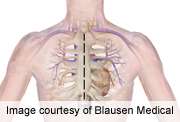(HealthDay)—For patients undergoing isolated coronary artery bypass grafting surgery, the variation in observed health care-acquired infection (HAI) rates across centers is 18.2 percent, according to a study published online July 1 in Circulation: Cardiovascular Quality and Outcomes.
Terry Shih, M.D., from the University of Michigan in Ann Arbor, and colleagues examined the rates of HAIs in 20,896 patients undergoing isolated coronary artery bypass grafting surgery at 33 medical centers in Michigan between Jan. 1, 2009, and June 30, 2012. Pneumonia, sepsis/septicemia, and surgical site infections were included as HAIs.
The researchers found that the overall HAI rate was 5.1 percent (isolated pneumonia, 3.1 percent; isolated sepsis/septicemia, 0.5 percent; isolated deep sternal wound infection, 0.5 percent; isolated harvest/cannulation site, 0.5 percent; isolated thoracotomy, 0.02 percent; multiple infections, 0.6 percent). There was variation in HAI subtypes across strata of center-level HAI rates. The predicted HAI risk differed by 2.8 percent across centers in absolute terms (3.9 to 6.7 percent; min:max), while the variation in observed rates was 18.2 percent (0.9 to 19.1 percent).
"There was an 18.2 percent difference in observed HAI rates across medical centers among patients undergoing isolated coronary artery bypass grafting surgery," the authors write. "This variability could not be explained by patient case mix. Future work should focus on the impact of other factors (e.g., organizational and systems of clinical care) on risk of HAIs."
More information:
Abstract
Full Text (subscription or payment may be required)
Journal information: Circulation: Cardiovascular Quality and Outcomes
Copyright © 2014 HealthDay. All rights reserved.



















